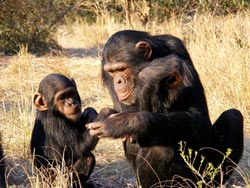Mother chimps crucial for offspring’s social skills

Just like in humans, chimp mothers play a crucial role in the development of social skills in their offspring. © Max Planck Institute for Psycholinguistics, Nijmegen<br>
Researchers from the Max Planck Institute for Psycholinguistics in Nijmegen, The Netherlands, observed that orphaned chimpanzees frequently engaged in social play, but their play bouts were much shorter and resulted in aggression more often. Apparently, chimpanzee mothers endow their offspring with important social skills.
It may not come as a surprise, but mother chimpanzees seem to be important for the development of social skills in young chimpanzees. “Orphaned chimpanzees had more difficulties to successfully coordinate their social play interactions,” says Edwin van Leeuwen from the Comparative Cognitive Anthropology Research Group at the Max Planck Institute for Psycholinguistics. “Since social play comprises a complex context in which signals about intentions need to be communicated, it seems that orphaned chimpanzees have missed out on valuable lessons from their mothers.”
Van Leeuwen and his co-authors Innocent Mulenga and Diana Lisensky compared the play behaviour of 8 orphaned and 9 mother-reared juvenile chimpanzees at the Chimfunshi Wildlife Orphanage Trust in Zambia. In this institution the orphan chimpanzees are initially cared for by humans. As soon as they are strong enough – usually with one or two years of age – they grow up in an orphan chimp group. “The chimps in the study were between four and nine years old, so they have kind of been raising each other”, explains van Leeuwen. The orphaned and mother-reared chimpanzees matched in age and sex.
Based on previous research, the scientists expected the orphaned juveniles to play less frequently and smoothly than the mother-reared chimpanzees: After all, the orphans had missed their most important caretaker throughout a sensitive socialisation period, and continued to lack a safe and facilitating social environment provided by their mothers.
Contrary to their expectations, the orphaned chimpanzees engaged in social play more frequently than the mother-reared juveniles, although for shorter amounts of time. But social play of the orphaned juveniles resulted more often in aggression than social play of the young chimps that were reared by their mother. “Although the orphaned chimps were motivated to play,” Van Leeuwen says, “it seems that they were less able to coordinate their play bouts and prevent them from resulting in aggression.”
Just like in humans, chimpanzee mothers seem to be important for the development of adequate social skills in their offspring, the researchers conclude. Van Leeuwen: “Mothers seem to prepare their offspring for challenges that are very important for successful group-living. For orphans, however, the presence of other adult role models may alternatively be beneficial for boosting social competence, which is an important consideration to entertain for sanctuaries dealing with integrations of chimpanzees.”
Contact
Edwin van Leeuwen
Max Planck Institute for Psycholinguistics, Nijmegen
Phone: +31 24 352-1184
Email: Edwin.vanLeeuwen@mpi.nl
Myrna Tinbergen
Max Planck Institute for Psycholinguistics, Nijmegen
Phone: +31 24 3521524
Email: myrna.tinbergen@mpi.nl
Original publication
Edwin J. C. van Leeuwen, Innocent Chitalu Mulenga, Diana Lisensky Chidester
Early social deprivation negatively affects social skill acquisition in chimpanzees (Pan troglodytes)
Animal Cognition, August 2013
Media Contact
More Information:
http://www.mpg.de/7516498/chimpanzee-mothers-social-skillsAll latest news from the category: Life Sciences and Chemistry
Articles and reports from the Life Sciences and chemistry area deal with applied and basic research into modern biology, chemistry and human medicine.
Valuable information can be found on a range of life sciences fields including bacteriology, biochemistry, bionics, bioinformatics, biophysics, biotechnology, genetics, geobotany, human biology, marine biology, microbiology, molecular biology, cellular biology, zoology, bioinorganic chemistry, microchemistry and environmental chemistry.
Newest articles

Silicon Carbide Innovation Alliance to drive industrial-scale semiconductor work
Known for its ability to withstand extreme environments and high voltages, silicon carbide (SiC) is a semiconducting material made up of silicon and carbon atoms arranged into crystals that is…

New SPECT/CT technique shows impressive biomarker identification
…offers increased access for prostate cancer patients. A novel SPECT/CT acquisition method can accurately detect radiopharmaceutical biodistribution in a convenient manner for prostate cancer patients, opening the door for more…

How 3D printers can give robots a soft touch
Soft skin coverings and touch sensors have emerged as a promising feature for robots that are both safer and more intuitive for human interaction, but they are expensive and difficult…





















